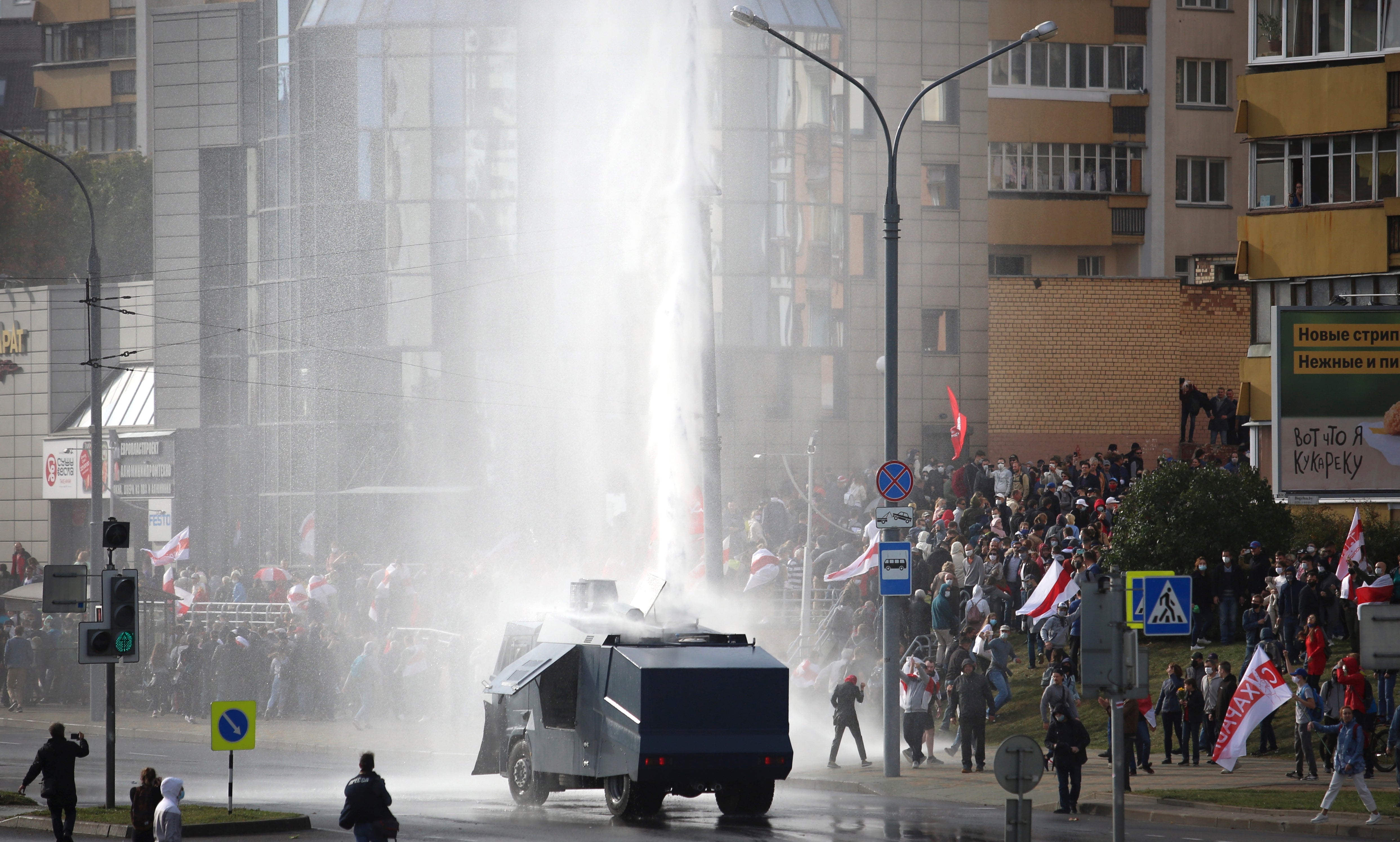Over 100,000 protest in Belarus for 9th straight Sunday
Tens of thousands of people marched in the Belarusian capital for the ninth straight Sunday, protesting against the country’s authoritarian leader

Your support helps us to tell the story
From reproductive rights to climate change to Big Tech, The Independent is on the ground when the story is developing. Whether it's investigating the financials of Elon Musk's pro-Trump PAC or producing our latest documentary, 'The A Word', which shines a light on the American women fighting for reproductive rights, we know how important it is to parse out the facts from the messaging.
At such a critical moment in US history, we need reporters on the ground. Your donation allows us to keep sending journalists to speak to both sides of the story.
The Independent is trusted by Americans across the entire political spectrum. And unlike many other quality news outlets, we choose not to lock Americans out of our reporting and analysis with paywalls. We believe quality journalism should be available to everyone, paid for by those who can afford it.
Your support makes all the difference.More than 100,000 people marched in Belarus capital for the ninth straight Sunday to protest against the country s authoritarian leader who won his sixth term in office in an election widely seen as rigged.
The demonstrators demanded the resignation of President Alexander Lukashenko and freedom for political prisoners. Police used water cannons in an attempt to disperse the crowds, but the protesters remained undeterred.
One video from the rally showed a group of protesters approaching a water cannon vehicle, opening a hatch on its side and removing pieces from inside the vehicle. Media reports say the water cannon malfunctioned after that and drove away.
The Viasna human rights center said that about 120,000 took part in a rally on Sunday.
Mass protests have rocked Belarus for almost two months, with the largest rallies taking place on Sundays and drawing up to 200,000 people. The unprecedented wave of unrest was triggered by the results of the Aug. 9 presidential election that handed Lukashenko, who has run Belarus with an iron fist for 26 years, a crushing victory with 80% of the vote.
His main challenger, Sviatlana Tsikhanouskaya got only 10%. She and her supporters refused to recognize the results as valid, saying the outcome of the vote was manipulated.
In the first days after the vote, Belarusian authorities cracked down brutally on the protesters, with police detaining thousands and injuring scores with truncheons, rubber bullets and stun grenades.
The government has since scaled down on the violence, but kept the pressure on, detaining hundreds of protesters and prosecuting top activists. Many prominent members of the Coordination Council, formed by the opposition to push for a transition of power, have been either arrested of forced to leave the country.
More than 10,000 people have been detained since the election and at least 244 people have been implicated in criminal cases on various charges related to the protests, Viasna human rights center leader Ales Bialiatski told The Associated Press. Over 70 people have been declared political prisoners.
On Sunday, 132 people were detained in Minsk and other cities, Viasna reported.
“A campaign of intimidation and persecution, unprecedented for Europe, has been launched in Belarus against peaceful citizens who want one thing — free elections,” Bialiatski said.
According to the Belarusian Association of Journalists, 11 Belarusian reporters were detained Sunday in several cities. Last week, Belarus' Foreign Ministry rescinded the accreditation of all journalists working for foreign news outlets and said they must apply for new credentials.
Tsikhanouskaya, who entered the presidential race to run instead of her husband Siarhei, a popular opposition blogger jailed in May, issued a statement Sunday supporting the protest and demands to free political prisoners.
She herself was forced to leave Belarus in fear for her safety and that of her children and is currently in exile in Lithuania.
“These are the people who, like Siarhei Tsikhanouski, haven't seen their family and children for several months. These are the people who suffered for their convictions, and are still suffering. Our goal is to free them. So I support everyone who takes to the streets in their city today,” Tsikhanouskaya said.
“Let the whole world see: Belarusians want to live in freedom, not in prison,” she added.